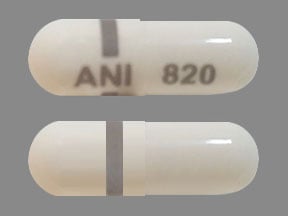
Mexiletine Coupons & Savings Card – Discount Prices from $30.85
Mexiletine is an anti-arrhythmic medication used to treat certain serious irregular heartbeats, specifically ventricular arrhythmias, which occur in the heart's lower chambers. It works by blocking specific electrical signals in the heart, stabilizing the heart rhythm to maintain a regular, steady heartbeat. This action reduces the risk of complications such as blood clots, heart attacks, or strokes. It is typically taken orally three times a day, and initial treatment requires heart rhythm monitoring through an electrocardiogram (EKG) to determine the correct dosage. Although the brand name Mexitil is no longer available, mexiletine can be obtained as a cost-effective generic capsule. Common side effects include nausea, vomiting, and heartburn, so it is advised to take the medication with food or antacids for better tolerance. Always consult your healthcare provider before starting any new medication to ensure it is safe and effective for you.
Our coupons are free to use. Before paying, show the pharmacist your Mexiletine savings card to get your free discount. Use our filters below to edit the prescription box to match your needs. The Mexiletine prices will update based on your prescription needs. Above our Mexiletine coupons, you can change your location to see pharmacy prices and costs in other areas. We're here to help you buy Mexiletine at the lowest price with our prescription discount card.
My prescription
Edit
150MG, Mexiletine (90 Capsules)
Select pharmacy

CVS
$30.85
COUPON PRICE
Walgreens
$31.59
COUPON PRICE
Walmart
$35.81
COUPON PRICE
Albertsons
$37.05
COUPON PRICEMexiletine savings card
Show this card to your pharmacist
CVS
$30.85
BIN
ID
PCN
GRP
019876
LHC5C90343
CHIPPO
LHX
Powered by
Mexiletine is an anti-arrhythmic medication used to treat certain serious irregular heartbeats, specifically ventricular arrhythmias, which occur in the heart's lower chambers. It works by blocking specific electrical signals in the heart, stabilizing the heart rhythm to maintain a regular, steady heartbeat. This action reduces the risk of complications such as blood clots, heart attacks, or strokes. It is typically taken orally three times a day, and initial treatment requires heart rhythm monitoring through an electrocardiogram (EKG) to determine the correct dosage. Although the brand name Mexitil is no longer available, mexiletine can be obtained as a cost-effective generic capsule. Common side effects include nausea, vomiting, and heartburn, so it is advised to take the medication with food or antacids for better tolerance. Always consult your healthcare provider before starting any new medication to ensure it is safe and effective for you.
Our coupons are free to use. Before paying, show the pharmacist your Mexiletine savings card to get your free discount. Use our filters below to edit the prescription box to match your needs. The Mexiletine prices will update based on your prescription needs. Above our Mexiletine coupons, you can change your location to see pharmacy prices and costs in other areas. We're here to help you buy Mexiletine at the lowest price with our prescription discount card.
Related antiarrhythmics prescriptions
coupons from$30.74Save 62%
coupons from$42.68Save 83%
coupons from$6.74Save 83%
coupons from$45.03Save -33%
coupons from$591.39Save 72%
coupons from$26.04Save 74%
coupons from$172.32Save -34%
coupons from$11.26Save 89%
More prescriptions for ventricular arrhythmia
coupons from$26.04Save 48%
coupons from$6.74Save 90%
coupons from$249.96Save 60%
coupons from$66.15Save 38%
coupons from$6.74Save 90%
coupons from$9.16Save 99%
coupons from$241.99Save 69%
coupons from$926.77Save 14%
Related antiarrhythmics prescriptions
Flecainide Save 62%coupons from $30.74
Tikosyn Save 83%coupons from $42.68
Betapace Save 83%coupons from $6.74
Propafenone Save -33%coupons from $45.03
Sotylize Save 72%coupons from $591.39
Pacerone Save 74%coupons from $26.04
Norpace Save -34%coupons from $172.32
Adenosine Save 89%coupons from $11.26
More prescriptions for ventricular arrhythmia
Amiodarone Save 48%coupons from $26.04
Sorine Save 90%coupons from $6.74
Norpace Cr Save 60%coupons from $249.96
Acebutolol Save 38%coupons from $66.15
Sotalol Save 90%coupons from $6.74
Quinidine Sulfate Save 99%coupons from $9.16
Quinidine Gluconate ER Save 69%coupons from $241.99
Betapace Af Save 14%coupons from $926.77
Mexiletine dosage forms
Use our Mexiletine 150MG coupon with prices from $30.85 for 90 Capsules. You can also use our Mexiletine 150MG coupon with prices from $2.87 for 1 Capsule. We have a Mexiletine 150MG coupon with prices from $13.60 for 30 Capsules. You can use our Mexiletine 150MG coupon with prices from $32.24 for 100 Capsules.
Dosage Quantity Price from Per unit 150MG 90 Capsules $30.85 $0.34 150MG 1 Capsule $2.87 $2.87 150MG 30 Capsules $13.60 $0.45 150MG 100 Capsules $32.24 $0.32 200MG 90 Capsules $35.28 $0.39 200MG 100 Capsules $38.20 $0.38 250MG 90 Capsules $47.86 $0.53 250MG 100 Capsules $50.26 $0.50
| Dosage | Quantity | Price from | Per unit |
|---|---|---|---|
| 150MG | 90 Capsules | $30.85 | $0.34 |
| 150MG | 1 Capsule | $2.87 | $2.87 |
| 150MG | 30 Capsules | $13.60 | $0.45 |
| 150MG | 100 Capsules | $32.24 | $0.32 |
| 200MG | 90 Capsules | $35.28 | $0.39 |
| 200MG | 100 Capsules | $38.20 | $0.38 |
| 250MG | 90 Capsules | $47.86 | $0.53 |
| 250MG | 100 Capsules | $50.26 | $0.50 |
